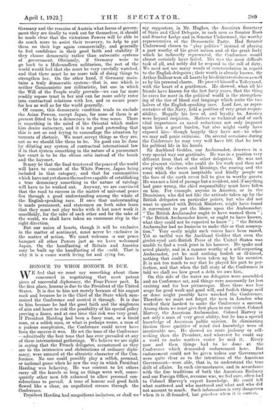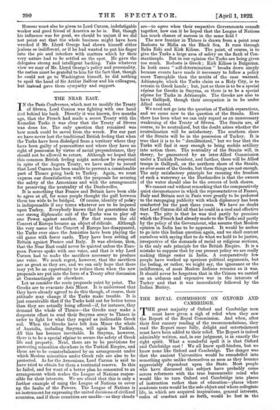HONOUR TO WHOM HONOUR IS DUE.
WE feel that we must say something about those concerned in negotiating that most potent piece of successful diplomacy, the Four-Power pact. In the first place, honour is due to the President of the United States. It is due to him not merely because of his august rank and because he is the Chief of the State which sum- moned the Conference and carried it through. It is due to him because he had the good faith and the singleness of aim and heart to risk the possibility of his special policy proving a fiasco, and at one time this risk was very great. If President Harding had been a fussy man, or a timid man, or a selfish man, or what is perhaps worse, a man of a jealous complexion, the Conference could never have been the success it was. He set the tone of the Conference —admittedly.the best tone that has ever prevailed at any of these international gatherings. We believe we are right in saying that the French delegate; accustomed as they are to the intricacies and elaborations of ordinary diplo- macy, were amazed at the altruistic character of the Con- ference. No one could possibly play a selfish, personal, or national game when he saw the way in which President Harding was behaving. He was content to let others carry off the laurels so long as things went well, conse- quently other men felt ashamed to allow personal con- siderations to prevail. A tone of honour and good faith flowed like a clear, an unpolluted stream through the Conference.
-President Harding had magnificent imitators, or shall we say supporters, in Mr. Hughes, the American Secretary of State and Chief Delegate, in such men as Senator Root and Senator Lodge and in Senator Underwood-, the worthy representative of the Democratic Party. Had Senator Underwood chosen to " play politics " instead of playing a part worthy of his great nation and of- the great body which he indirectly represented, the Conference would almost certainly have failed. His was the most difficult task of all, and nobly did he respond to the call of duty. We need not use many words of commendation in regard to the English delegates ; their worth is already known. Sir Arthur Balfour won all hearts by his disinterestedness as well as by his personal charm. He proved himself a Talleyrand, with the heart of a gentleman. He showed, what all his friends have known for the last forty years, that the thing he cares for most in the political world is the strengthen- ing of the ties of blood and language which unite the two halves of the English-speaking race. Lord Leo, as repre- sentative of the Navy, held a position of very great respon- sibility. Happily his love of, and loyalty to, America were beyond suspicion. Matters so technical and of such vital importance as naval reductions not only imposed upon him a great burden, but also might easily have exposed him—though happily they have not—to what we may call panic criticism. On several occasions during the Conference he may very well have felt that he took his political life in his hands. Sir Auckland Geddes, our Ambassador, deserves in a very special way our gratitude. He was in a position very different from that of the other delegates. He was not the pleaeant visitor, who could do his work and then sail away with the cheers and blessings, the roaring and the roses which the most hospitable and kindly people on the face of the earth never fail to give to worthy guests. He was not a bird of passage but a resident, and, if anything had gone wrong, the chief responsibility must have fallen on him. For example, anyone in America, or in the Dominions, who did not like the attitude taken up by the British delegates on particular points, but who did not want to quarrel with British Ministers, might have found it convenient to put the blame upon the Ambassador'. " The British Ambassador ought to have warned them " ; " the British Ambassador knew, or ought to have known, what they could not be expected to know " ; " the British Ambassador had no business to make this or that assump- tion." Very easily might such voices have been raised. Yet so tactful was Sir Auckland Geddes that even the gimlet-eyed anti-British Press of the United States was unable to find a weak joint in his harness. He spoke and acted plainly, and in a manner worthy of a self-respecting Ambassador, yet he said nothing foolish or ill-timed, nothing that could have been taken up by his enemies. It is not too much to say that he played his part to per- fection, and that when the full story of the Conference is told we shall see how great a debt we owe him. On this side of the water no delegates were assembled and no Conference sat, and things were necessarily far less exciting and far less picturesque. Here there was less scope for good work and good will, and foolish things said or done might possibly have wrecked the Conference. Therefore we must not forget the men in London who worked their hardest to make the Conference a success. Among them we must give first place to our visitor, Colonel Harvey, the American Ambassador. Colonel Harvey is not only a man of very great ability, but he has a special knowledge of American public opinion. ' In eliminating friction these qualities of mind and knowledge were of inestimable use. He showed no more jealousy or self- seeking than than the President, and, wherever he could, say a word to make matters easier he said it., Every now and then things had to be done at the Conference which demanded endorsement here. But endorsement could not be given unless our Government were quite clear as to the intentions of the American Government—were able, that is, to understand the true drift of affairs. In such circumstances, and in accordance with the fine traditions of both the American Embassy and our Foreign Office, recourse was, we feel sure, often had to Colonel Harvey's expert knowledge. He could tell what mattered and who mattered and what and who did not amount to much. Such information is very dangerous when it. i3 ill-founded, but priceless when• it is correct, Honour must also be given to Lord Curzon, indefatigable worker and good friend of America as- he is. But, though his influence was for good, we should be unjust if we did. not point out that the whole business might have been wrecked if Mr. Lloyd George had shown himself either -jealous or indifferent, or if he had wanted to put his finger into the pie- and interfere with matters which by their very nature had to he settled on the spot. He gave the delegates strong and intelligent backing. Take whatever view we- may of Mr. Lloyd George's policy and personality, the nation must be grateful to him for the fact that, though he could not go to Washington himself, he did nothing to spoil the hand of Sir Arthur Balfour and his colleagues, but instead gave them sympathy and support.



































 Previous page
Previous page